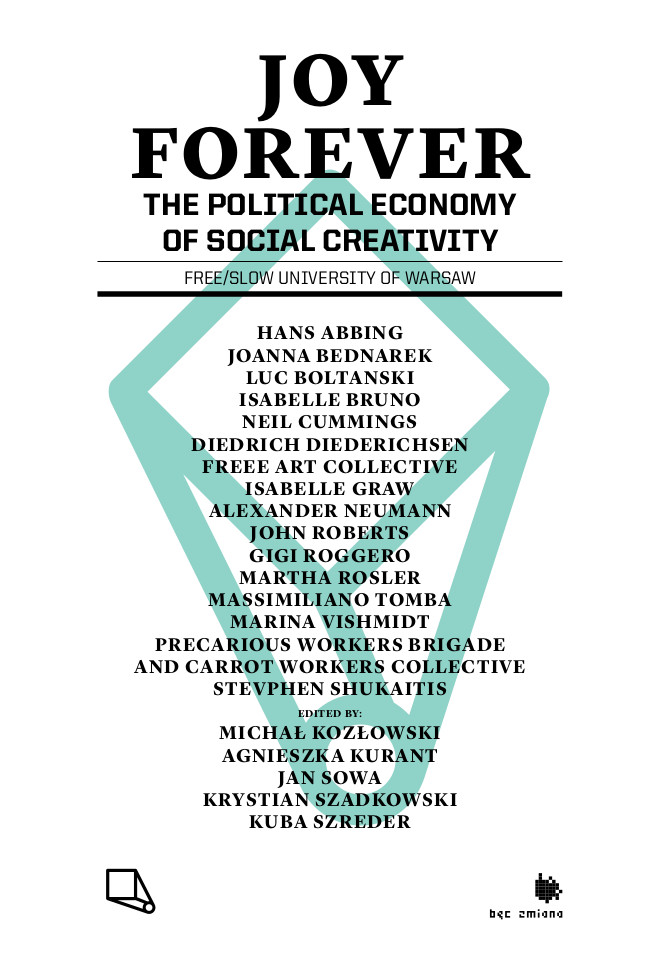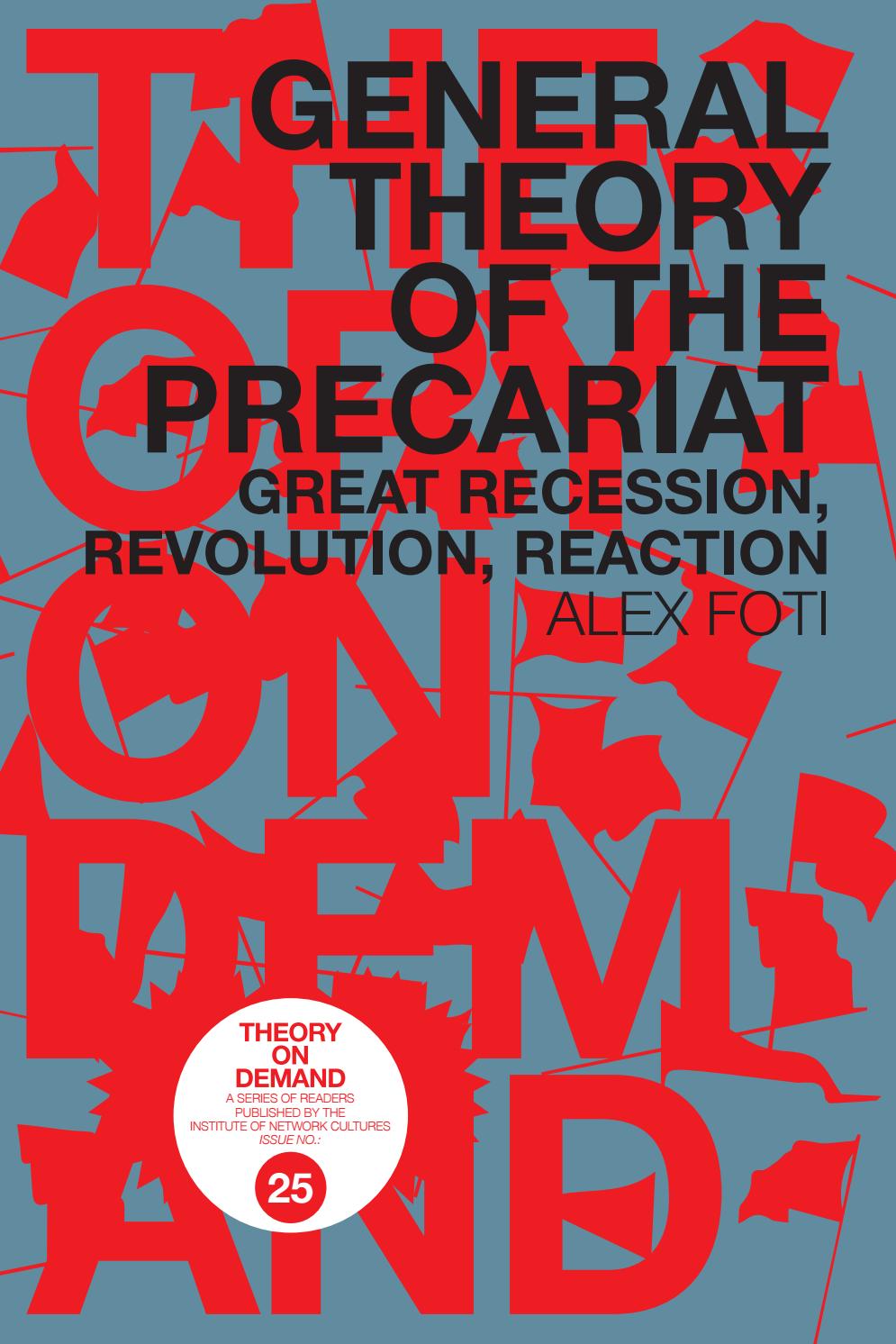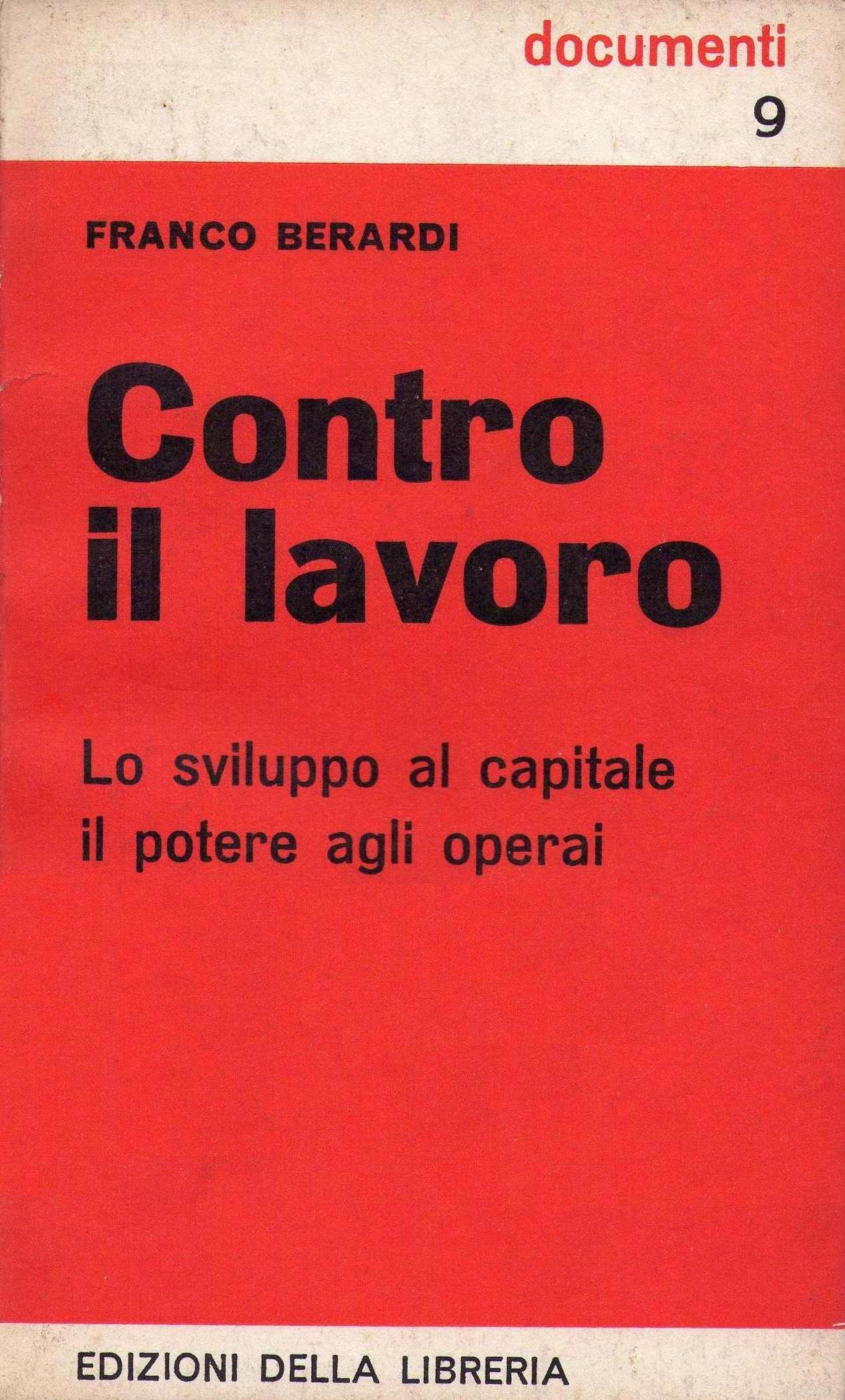Joy Forever: The Political Economy of Social Creativity (2014)
Filed under book | Tags: · art, creativity, labour, resistance, value

“The title Joy Forever refers to the false promise of a common happiness, constantly played out by the proponents of the creative class and creative economy – the very promise that since Romanticism has been ascribed to art itself, a vow which remains unfulfilled. The aim of the publication is to scrutinize the false promises of distributed creativity as an ideology of cognitive capitalism. The authors devote themselves to critical examination of the structural links between art, creativity, labour and the creation of value under contemporary relations of production. Some of them do not stop at a critical diagnosis but go further, reflecting upon potential alternatives to the status quo.
The book covers more than the issues of a narrowly understood art world, despite the fact that it pays a lot of attention to them. Art is conceived here as a social lab, where innovative ways of organizing of labour, socializing both for labour and through labour, as well as different types of production, speculation, generation and accumulation and appropriation of value are experimented with and tested.
The book gathers papers based on presentations at the conference Labour of the Multitudes? Political Economy of Social Creativity, organized in Warsaw in October 2011. It includes contributions by Luc Boltanski, Neil Cummings, Diedrich Diederichsen, Isabelle Graw, Massimiliano Tomba, Stevphen Shukaitis, Martha Rosler, and others.”
Edited by Michał Kozłowski, Agnieszka Kurant, Jan Sowa, Krystian Szadkowski and Jakub Szreder
Publisher Free/Slow University of Warsaw, in cooperation with MayFly Books, London, 2014
Creative Commons BY-NC-ND 4.0 International License
ISBN 9781906948191, 1906948194
xviii+274 pages
Publisher (EN)
Publisher (PL)
WorldCat
Alex Foti: General Theory of the Precariat: Great Recession, Revolution, Reaction (2017)
Filed under book | Tags: · ecology, economics, labour, marxism, precariat, precarity, work

“From the fast-food industry to the sharing economy, precarious work has become the norm in contemporary capitalism, like the anti-globalization movement predicted it would. This book describes how the precariat came into being under neoliberalism and how it has radicalized in response to crisis and austerity. It investigates the political economy of precarity and the historical sociology of the precariat, and discusses movements of precarious youth against oligopoly and oligarchy in Europe, America, and East Asia. Foti covers the three fundamental dates of recent history: the financial crisis of 2008, the political revolutions of 2011, and the national-populist backlash of 2016, to present his class theory of the precariat and the ideology of left-populist movements. Building a theory of capitalist crisis to understand the aftermath of the Great Recession, he outlines political scenarios where the precariat can successfully fight for emancipation, and reverse inequality and environmental destruction. Written by the activist who put precarity on the map of radical thinking, this is the first work proposing a complete theory of the precariat in its actuality and potentiality.”
Publisher Institute of Network Cultures, Amsterdam, 2017
Theory on Demand series, 25
Creative Commons BY-NC-ND 4.0 International
ISBN 9789492302182
155 pages
Franco Berardi: Contro il lavoro: lo sviluppo al capitale il potere agli operai (1970) [Italian]
Filed under book | Tags: · autonomy, capitalism, ideology, labour, work

“Questo lavoro vuole essere un primo tentativo di costruire sia pure in modo tutto provvisorio, tutto legato alla insorgenza di nuove possibilità ed indicazioni anche teoriche, una impostazione che, partendo dal punto di vista capitalistico, dalla demistificazione dell’ideologia, della scoperta, al di sotto dell’ideologia, dello sviluppo reale del capitale, giunga a decifrare in termini di progetto strategico l’emergenza dei livelli di composizione operaia.
Tutto quello che vi è in questo saggio manifesta la sedimentazione progressiva di ipotesi e linee teoriche legate a situazioni che oggettivamente crescono: e non si può fissare un livello in modo astratto, come ottimale; ma la linea strategica, per non trasformarsi in ideologia, va vista come articolazione teorica del livello pratico delle lotte, che cresce col loro crescere, e non si ferma e fissa ad un livello ottimo. In questo senso i dislivelli (percepibili persino nel linguaggio) rappresentano la crescita di un discorso come articolazione teorica della crescita pratica delle lotte dell’autonomia, dell’organizzazione.”
Publisher Edizioni della Libreria, Milan, 1970
161 pages
via Silvio
PDF (30 MB)
Internet archive (version cleaned by Grafton9, added on 2017-9-6)

